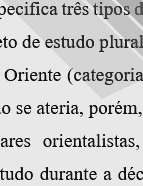

................................
Although the Annales school, with whom Godinho had already established a close relationship at the time, was the central reference of the SPHC project, it was at the hand of a group of its authors that the first historiographical works which may be referred to as Marxist emerged (Carvalho, As invenções técnicas e a história económica [Technical inventions and economic history], 1944; Torres, Religiões Primitivas [Primitive Religions], 1944; Azevedo, Condições Económicas da Revolução Portuguesa de 1820 [Economic Conditions of the Portuguese Revolution of 1820], 1944; Saraiva, Para a História da Cultura em Portugal [Towards a History of Culture in Portugal], 1946; Castro, Introdução ao estudo da economia portuguesa [Introduction to the study of the Portuguese Economy], 1947; Macedo, A situação económica no tempo de Pombal [ The economic situation during the Pombaline era], 1951). It should also be noted that, with the exception of Magalhães Godinho himself, several of the members of the SPHC were members of, or had strong sympathies with, the PCP.
The second phase of Marxist historiography's affirmation in Portugal began in the late 1950s and lasted through the 1960s, marking a decade in which works by new authors flourished. The provenance of these new authors was relatively diverse, although they all equally maintained a relationship of sympathy and/or militancy with the PCP. Some were part of a small and ephemeral group of historical studies formed in the Peniche prison, bringing together militants and Party leaders. Álvaro Cunhal and António Borges Coelho were noteworthy figures among this group with their works regarding 1383 (Coelho, A Revolução de 1383 [The Revolution of 1383], 1965; Cunhal, Les luttes de classe au Portugal à la fin du moyen âge, 1967 [former versions of this text had been published in French Marxist magazines a few years earlier]) between the 1950s and the 1960s. However, while Cunhal's historiographical production did not advance any further, Borges Coelho then embarked on a long path, during which he focused on themes such as the Arab presence, Portuguese expansion, the Inquisition, among others, until the writing of his more recent new history of Portugal, in several volumes (Coelho, História de Portugal [History of Portugal], 2010-2013).
On the fringes of the Peniche Group, but also publishing their first work in the 1960s, Victor de Sá and José Manuel Tengarrinha were also prominent figures in this second phase, namely due to their contributions to the history of the 19th century.
